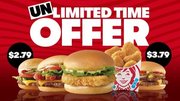Article
McDonald's breakfast sales not impacted by new competition
The company is undergoing a 're-set' to emphasize the importance of staffing and enhance the customer experience.

April 22, 2014 by Alicia Kelso — Editor, QSRWeb.com
McDonald's U.S. comp sales were down 1.7 percent in Q1, and the company cited negative guest count due, in part, to severe winter weather.
During today's earnings call, CEO Don Thompson also admitted the company has become too focused on unit-level economics and profitability, and not focused enough on "the basics" that enhance customer experience. He hopes to change that and is starting with an initiative called "re-set," taking place throughout the first six months of this year.
The re-set emphasizes the importance of proper staffing, scheduling and positioning of the crew to build restaurant capacity, particularly during peak hours.
"Because service is such a foundational element of the customer experience, we recognize the need to elevate service levels to build visits," Thompson said. "It's really 'back to the basics' with some enhancements to our productivity and capacity in our restaurants."
To help maximize operational efficiency, McDonald's is rolling out its new kitchen prep tables, which will be installed systemwide by mid-year. The high-density prep tables are a key enabler for the brand's "future menu," Thompson said, and provide more room to add new ingredients, grill and chill stations to add more fresh ingredients, and a mirror image condiment station to expedite preparation.
"These things together help support our future vision of the menu. That doesn't mean we're going to add a lot of things, but It gives us the capacity to optimize some products and the flexibility to add new toppings and customize products," Thompson said. "In the U.S., it's going quite well."
Breakfast wars
Although Thompson never mentioned Taco Bell's recent entry into the breakfast daypart (or its ad campaign aimed directly at McDonald's), he did reiterate the importance of the morning business for the company, and said sales have not been impacted to "the most recent competitor entering the space."
"One of the things that happens is customers will try the (new) breakfast — it's something new that they've not seen before, something we expect them to try. New entrance into the market always brings a different level of attention to breakfast, which in many cases supports us," he said. "Breakfast continues to be a positive driver in our business and actually forces us to focus even more on being aggressive."
Thompson said the company will continue to focus on the strong morning daypart (which generates about 25 percent of all sales) and will strengthen its messaging around quality and preparation.
"Customers choose McDonald's because of our great products that are cooked in our restaurants," he said." We crack fresh eggs, grill sausage and bacon, bake biscuits and toast muffins. We have to make sure we focus on the strengths and inform customers why we've been in breakfast for over 30 years and why it's their favorite place to eat. We don't plan on giving that up."
Other initiatives
Marketing/menu. Marketing the overall menu will also remain a priority, as McDonald's aims to generate stronger awareness. It will maintain a "constant drumbeat of communication" about its core products — such as the Big Mac, fries and Quarter Pounder — which make up about 40 percent of total sales.
And, the company will try to harness its breadth of data into more customer-centric plans and actions.
"Our local market teams are translating these learnings into comprehensive plans to improve the customer experience. It will take time to notice the changes and for (customers) to reward us with increased business. There is no silver bullet," Thompson said.
Digital.McDonald's will also try to broaden its appeal through digital initiatives, and has increased its budget toward these efforts. Thompson provided minimal details about the chain's digital pipeline, but said there are a few areas of opportunity to enhance interactions with the customer, including payment, ordering and redemption.
"We've got several test markets around the world and are leveraging what they've already done and we are looking to scale the best ideas we have," he said.
Cost increases.Finally, Thompson and CFO Pete Bensen discussed added cost pressures from commodities (driven by higher protein costs), as well as potential minimum wage increases and Obamacare implementation next year. Since the beginning of 2014, 13 states have raised the minimum wage, Bensen said, and the federal level is also expected to rise in the near term.
"You see franchisees around the industry anticipating some of these higher input costs. And for a lot of them, health care kicks in in 2015. So they're mindful of that. These cost pressures are on everyone's mind," he said. "But you have to strike a balance. As we get too focused on profitability and less on the customer, that's when we run into challenges."
"We have to remain grounded in our consumers and get back to that consumer focus," Thompson added.
 ChatGPT
ChatGPT Grok
Grok Perplexity
Perplexity Claude
Claude








